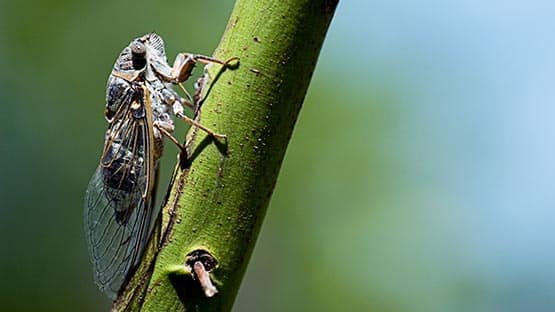
There’s been a lot of hype about a rare cicada emerging this spring, but one expert said most parts of Virginia have nothing to worry about.
Starting late this month, Virginians living south of Caroline and east of the Interstate 95 corridor should be looking for the emergence of Brood XIX, a 13-year periodical cicada produced from eggs laid in 2011. Virginians living along the North Carolina border, especially in Brunswick County, should also be on the lookout.
“We are at the very edge of the range of Brood XIX. This makes it difficult to predict exactly where Brood XIX cicadas will emerge,” said Doug Pfeiffer, professor and Extension specialist in the Department of Entomology at Virginia Tech in Blacksburg. “Urban development also affects where we will see cicadas. These insects need trees – hosts longed-lived enough to support multiple generations of 13-year life cycles. Urban development can do away with local cicada populations.”
Brood XIX cicadas will live briefly, mating and laying eggs. After a few weeks, the adults will die, and their bodies will provide nutrients to our ecosystem.
“Although cicadas are noisy and numerous, they are harmless to humans and pets,” Pfeiffer said.
This year’s Brood XIX eggs will hatch into tiny cicada nymphs, which will burrow into the soil, where they will spend the next 13 years feeding on the water and nutrients transported through the vascular system in plant roots, according to Pfeiffer.
A periodical cicada outbreak can cause damage for fruit growers.
“Cicadas can come in and overwhelm an orchard quickly,” said Pfeiffer. “If you have young trees, bushes or vines in an area predicted to see an outbreak, you can consider protecting them with bird netting.”
Although Virginia will only experience the emergence of Brood XIX, a brood of 17-year cicadas called Brood XII will also emerge in 2024. This brood lives in parts of Southern Illinois, and there is little geographic overlap between these two broods.
Cicadas: What you need to know
- Most Virginians will not see periodical cicadas in 2024
- There are annual cicadas that emerge every year
- Annual cicadas have black-green coloring
- Periodical cicadas have black-red-orange coloring
- Cicadas are harmless to people and pets
- Adult cicadas do not damage your plants, but young woody plants can be damaged by the egg-laying process
- Periodical cicadas evolved to avoid predators
- Cicadas do not bite and are safe for people, including children, to handle and explore
- There are multiple species of periodical cicadas in an emergence
- Brood XIX includes four species, each of which has a slightly different appearance and auditory call
- Periodical cicadas exist only in North America










